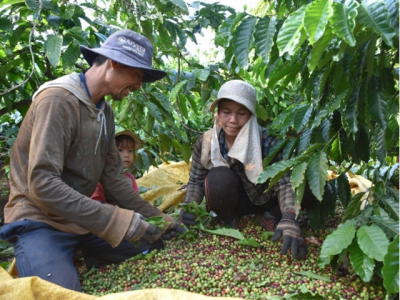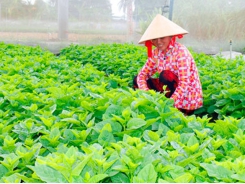VnSAT promotes the value chain of sustainable coffee production

Due to the support from the VnSat Project, coffee growers have reduced production costs by about 20-25%, increased productivity, and increased profits by 15-20% than before.
With economic irrigation systems and sustainable farming techniques, coffee in the areas invested by the VnSat Project has significantly improved yield and quality. Photo: Tuan Anh.
As a unit developing according to the model of linking production with product consumption, Ia Mo Nong Agricultural and Tourism Service-Production Cooperative Cooperative (Chu Pah district, Gia Lai province) currently have about 369 affiliate members and more than one 100 non-affiliated members.
With nearly 500 hectares of coffee, this year's coffee yield of the Cooperative is about 4 tonnes per hectare. The total output is about 2,000 tonnes. With the current coffee price fluctuating around VND 41,000-42,000 per kilogram, the cooperative will make a big profit.
Mr. Le Van Thanh, Director of Ia Mo Nong Cooperative, said that the Cooperative had signed a contract with Vinh Hiep Co., Ltd. to consume about 1,000 tonnes of coffee beans and 800 tonnes of fresh coffee.
According to Mr. Thanh, this achievement is thanks to the Vietnam - Sustainable Agriculture Transformation Project (VnSAT Project).
Mr. Thanh said, right when he first established the Cooperative in 2018, and he went to many places to learn several Cooperative development models. Then, knowing that the VnSat project is supporting coffee farmers very effectively, he requested the VnSAT Gia Lai Project Management Board for support.
By the end of 2019, Ia Mo Nong Cooperative was officially supported by VnSat Project to invest in an economical irrigation system in the form of 50/50 reciprocal. For the first time, the VnSat project was funded in 4.5 hectares and found very effective. As a result, the project has supported investment for the Cooperative with 62 hectares of economic irrigation system.
The VnSat project also supports training on sustainable coffee production and re-cultivation. Accordingly, all members of the Cooperative are trained on how to grow and care for coffee trees effectively to increase productivity and quality.
Towards a sustainable coffee development model, the VnSat Project continues to support investment for the Cooperative in high-quality coffee processing and preliminary processing equipment. Recently, the project has invested more than 6 kilometers of concrete road going to the coffee production area of the cooperative with a cost of more than VND 13 billion.
Mr. Le Van Thanh, Director of Ia Mo Nong Cooperative, said that if the VnSat project prolongs the support period and expands it to more people, it will significantly affect the coffee industry.
Previously, without coffee processing machines, people selling coffee did not earn high profits. At present, with the Cooperative's guidance, when the coffee is 80% ripe, the profit will be much higher.
Ms. Pham Thi Huyen Anh, Chairman of the Board of Directors of Po Ko Fair Agriculture Cooperative, said that the sustainable coffee production model of the VnSat project helps to participate farmers have a clear orientation and development plan and more sustainable.
In particular, applying economic watering technology or investment in machinery also helps organizations participating in the project save resources in production and simultaneously improve product quality.
Specifically, the Cooperative is trained more carefully and scientifically on sustainable coffee farming, ensuring traceability, and improved production capacity. The Cooperative is also more proactive in finding outputs and forming valuable links with traders.
Mr. Le Quoc Tuan, Deputy Director of the VnSat Project Management Board in Gia Lai province, said that farmers' organizations and cooperatives have been operating effectively through the support from the VnSat Project, typically such as the Ia Mo Nong Cooperative, the Dak Krong Agriculture and Service Cooperative (Dak Doa District), the Phoenix Construction - Trade and Service Cooperative, the Agriculture - Trade and ecological Tourism Service Cooperative Ham Rong...
Compared with other production models, the models supported by the VnSat Project have reduced production costs by about 20-25% in terms of nitrogen fertilizers, pesticides, and irrigation water. Meanwhile, productivity increases by about 20%, and profits are higher by 15-20%.
Ms. Duong Thi Thanh Luong, Deputy Director of the VnSat Project Management Board in Kon Tum province, said that the project is currently training and improving management capacity for 17 farmer organizations. These organizations have linked with businesses supplying materials, fertilizers, and coffee products to farmers.
Post-harvest coffee products of all members of farmer organizations are consumed, without price pressure from traders, coffee products are of higher quality. Since then, improved the value of coffee trees, contributing to the sustainable development of the coffee industry in Vietnam.
According to the VnSat Project in Gia Lai province, from 2015 to 2020, six districts with 20 farmer organizations and cooperatives in the province received support from the project. Accordingly, the number of households participating in sustainable coffee production is 4,496 households/10,233 hectares, the number of households participating in sustainable coffee replanting is 5,385 households/5,469 hectares.
The VnSat project in Kon Tum province has also been implemented in 3 districts of Dak Ha, Dak Glei, and Kon Plong, with the total number of households participating in the project being 4,530 households/4,126 hectares. In which the number of households participating in sustainable coffee production is 3,119 households/3,388 hectares, the number of households participating in sustainable coffee re-cultivation is 1,411 households/738.7 hectares.
Related news
Tools

Phối trộn thức ăn chăn nuôi

Pha dung dịch thủy canh

Định mức cho tôm ăn

Phối trộn phân bón NPK

Xác định tỷ lệ tôm sống

Chuyển đổi đơn vị phân bón

Xác định công suất sục khí

Chuyển đổi đơn vị tôm

Tính diện tích nhà kính

Tính thể tích ao



 Massive planting of orange trees should be minimised…
Massive planting of orange trees should be minimised…  Agricultural production restored after Covid-19 epidemic
Agricultural production restored after Covid-19 epidemic